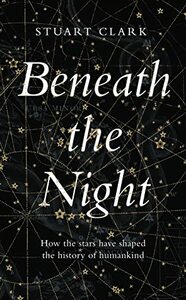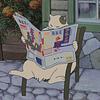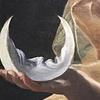Take a photo of a barcode or cover
informative
lighthearted
reflective
relaxing
the cosmic sublime part Best section. we are made of stardust/moon landing/space race close second. Back half of this book really pulling its weight lol.
"Our connection to the night sky is inescapable, it is instinctive, it is what it means to be human."
110th book of 2022.
Recently, my girlfriend and I have decided to better our knowledge on astronomy/space/physics. We are both graduates of English/History/Creative Writing, so these are not our subjects, but we have, together, become obsessed. A few weeks ago we saw Brian Cox live, during his Horizons Tour, talk about space, black holes, reality, etc., on a big stage with a huge screen behind him giving amazing visual representations of stars exploding and planets being formed. And now, we are finding all sorts of books to continue reading and learning about our newfound field of interest.
Clark’s book is fascinating for a layman like myself. He begins at the beginning, and talks about the relationship early humans had with the stars: what did it mean for them? Why did they look at the stars? What do some of the early structures we know of today (Stonehenge, the Pyramids) have to do with the stars? He talks about the invention of Heaven. He writes some mindboggling little sentences explaining how, looking at cave paintings of constellations, we can see that when we look up at the stars and their patterns, we are having the same thought processes humans had thousands of years ago. Clark points out, several times, that though the original humans lacked knowledge, their minds are not so different from ours, and they felt all the things we feel today.
I found the middle part of the book slightly less interesting as Clark unpicks the history calendars and timekeeping and the zodiacs. Though it is interesting to see how things were explained and answered for so long ago, generally I found the detail in the calendar formations a little dry. Soon though, he pushes on, and we find ourselves with Newton and the discoveries of his era. Then we find ourselves in the 20th century and the space race begins. A lot of the general stuff I knew already, but of course there is greater detail here. (Namely, about Ham, the monkey who was sent into space by the US. His capsule was found in the sea and 4-year-old Ham was completely unharmed other than a slightly bruised nose. He lived for another twenty-two years.) By the end, Clark then ruminates on the astronauts after they came home, and I found the final chapter very poignant.

In the end, he says the astronauts struggled to put their experiences into words. How could you? He quotes Apollo 11 astronaut Michael Collins, who piloted the command module as the men were on the moon, who said, ‘‘The pity of it is that so far the view [of Earth from space] has been the exclusive property of a handful of test pilots, rather than the world leaders who need this new perspective, or the poets who might communicate it to them.’’ Clark, with Collins, empowers writers in believing that they are needed to attempt to put into words what it is like to be in the void of space, to look at our blue marble from the moon, like the famous and beautiful ‘Earthrise’ photograph. When Clark wrote this, I suppose he meant it to be comforting, awe-inspiring. My girlfriend and I are continually amazed by space because of something he defines in the book, the ‘sublime’, the terrifying and the beautiful, at once. There is something horribly daunting about space’s emptiness but also oddly comforting, too. For me, reading it, like the astronauts back in ’69, it made me angry at the world. Reading today about Ukraine again, and fears that Putin’s losing war may turn to tactical nuclear missiles, and the West using the verb ‘annihilate’ in their warning, it is hard not to be. As Apollo 14 astronaut said, ‘‘You want to grab a politician by the scruff of the neck and drag him a quarter of a million miles out and say, ‘Look at that, you son of a bitch.’’’

Recently, my girlfriend and I have decided to better our knowledge on astronomy/space/physics. We are both graduates of English/History/Creative Writing, so these are not our subjects, but we have, together, become obsessed. A few weeks ago we saw Brian Cox live, during his Horizons Tour, talk about space, black holes, reality, etc., on a big stage with a huge screen behind him giving amazing visual representations of stars exploding and planets being formed. And now, we are finding all sorts of books to continue reading and learning about our newfound field of interest.
Clark’s book is fascinating for a layman like myself. He begins at the beginning, and talks about the relationship early humans had with the stars: what did it mean for them? Why did they look at the stars? What do some of the early structures we know of today (Stonehenge, the Pyramids) have to do with the stars? He talks about the invention of Heaven. He writes some mindboggling little sentences explaining how, looking at cave paintings of constellations, we can see that when we look up at the stars and their patterns, we are having the same thought processes humans had thousands of years ago. Clark points out, several times, that though the original humans lacked knowledge, their minds are not so different from ours, and they felt all the things we feel today.
I found the middle part of the book slightly less interesting as Clark unpicks the history calendars and timekeeping and the zodiacs. Though it is interesting to see how things were explained and answered for so long ago, generally I found the detail in the calendar formations a little dry. Soon though, he pushes on, and we find ourselves with Newton and the discoveries of his era. Then we find ourselves in the 20th century and the space race begins. A lot of the general stuff I knew already, but of course there is greater detail here. (Namely, about Ham, the monkey who was sent into space by the US. His capsule was found in the sea and 4-year-old Ham was completely unharmed other than a slightly bruised nose. He lived for another twenty-two years.) By the end, Clark then ruminates on the astronauts after they came home, and I found the final chapter very poignant.

In the end, he says the astronauts struggled to put their experiences into words. How could you? He quotes Apollo 11 astronaut Michael Collins, who piloted the command module as the men were on the moon, who said, ‘‘The pity of it is that so far the view [of Earth from space] has been the exclusive property of a handful of test pilots, rather than the world leaders who need this new perspective, or the poets who might communicate it to them.’’ Clark, with Collins, empowers writers in believing that they are needed to attempt to put into words what it is like to be in the void of space, to look at our blue marble from the moon, like the famous and beautiful ‘Earthrise’ photograph. When Clark wrote this, I suppose he meant it to be comforting, awe-inspiring. My girlfriend and I are continually amazed by space because of something he defines in the book, the ‘sublime’, the terrifying and the beautiful, at once. There is something horribly daunting about space’s emptiness but also oddly comforting, too. For me, reading it, like the astronauts back in ’69, it made me angry at the world. Reading today about Ukraine again, and fears that Putin’s losing war may turn to tactical nuclear missiles, and the West using the verb ‘annihilate’ in their warning, it is hard not to be. As Apollo 14 astronaut said, ‘‘You want to grab a politician by the scruff of the neck and drag him a quarter of a million miles out and say, ‘Look at that, you son of a bitch.’’’

informative
reflective
medium-paced
informative
inspiring
medium-paced
A really good and entertaining overview of the history of human kind told through our relationship with stars. Particularly liked the chapter on music of the spheres, as well as references to Joni Mitchell.
The facts aren't new, but the arrangement is beautiful.
"By reaching into the night sky, we can now look back at Earth and feel awe-struck by its beauty. We have inverted the traditional way of thinking. It is no longer space that is the awesome thing: it is the fragile balance of Earth. This is the true legacy of the space race – not Teflon or any of the other supposed technological spin-offs, but the realisation that our home planet is not as big as we think from the surface.
The wider truth is that the night sky now has a greater influence on us that at any other time in history. We are more connected to the cosmos than ever before, yet unaware of it because we have normalised it. We now use satellites for communications, for weather forecasting , for navigation. There are even prototype clocks that gather the radio signals from fast-spinning starts to tell the time more accurately than most clocks on Earth. We use space now for all the same things that the earliest hunter-gatherers used it for. We have come full circle – we just do it more reliably nowadays because of technology."
"By reaching into the night sky, we can now look back at Earth and feel awe-struck by its beauty. We have inverted the traditional way of thinking. It is no longer space that is the awesome thing: it is the fragile balance of Earth. This is the true legacy of the space race – not Teflon or any of the other supposed technological spin-offs, but the realisation that our home planet is not as big as we think from the surface.
The wider truth is that the night sky now has a greater influence on us that at any other time in history. We are more connected to the cosmos than ever before, yet unaware of it because we have normalised it. We now use satellites for communications, for weather forecasting , for navigation. There are even prototype clocks that gather the radio signals from fast-spinning starts to tell the time more accurately than most clocks on Earth. We use space now for all the same things that the earliest hunter-gatherers used it for. We have come full circle – we just do it more reliably nowadays because of technology."
informative
inspiring
reflective
medium-paced
challenging
emotional
hopeful
informative
inspiring
reflective
medium-paced







